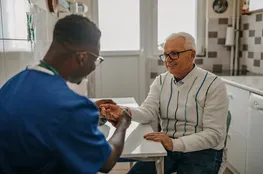Caring for aging parents while still in your 20s is a unique and challenging experience that affects many millennials. I remember confessing to my best friend Tessa, "I think things will be easier if my mom dies first." This sentiment might seem harsh to outsiders, but Tessa understood. Both of our fathers suffer from terminal lung diseases, yet our relationships with our moms are far from ideal. My mom is healthy but tends to be forgetful, overly trusting, isolated, and naïve, which causes me constant worry. Tessa and I first met working as cashiers at our college bookstore. Today, she's a dedicated math teacher, happily married, and a new mom at 29.
Meanwhile, I am a healthcare reporter based in Oakland, CA, with interests outside work like art classes and leisurely Bay Area walks alongside my 9-year-old cat, Clark. I'm approaching 28, and like Tessa, I face the responsibility of caring for my older parents, a role that has, in some ways, deprived us of the carefree 20s our peers seem to enjoy. Instead of lively conversations about a new crush or debating fashion choices for a date, Tessa and I discuss the complexities of federal healthcare systems and the intricacies of arranging parental care, all while maintaining the balance of our own hectic lives. Our time isn't filled with excitement for holidays or calls home for advice. Rather, it boasts a constant anticipation of the next shoe to drop, leaving Tessa and me to rely on each other for support.
As one of many millennials entangled in what is ominously called the "elder-care crisis," navigating early adulthood becomes arduous, especially with unresolved familial tension and earning less than our parents did at our age. This situation, often labeled as "caregiver creep," introduces burdens like credit card debts, student loans, and imposing societal expectations. Financial stress adds to this with even the needs of a pet like Clark becoming exorbitant, despite pet insurance. I harbor dreams of saving money, traveling, and upgrading from my studio apartment to gain a personal bedroom and reprieve from staring at my work desk at bedtime. Yet, I am aware that when my father's condition worsens and he eventually passes, I'll require financial means to arrange immediate flights home, ready to help my mom sort through the aftermath.
Recently earning my master's from Syracuse University's Newhouse School, the persistent hope that my dad would survive until I reached my degree completion underscored those years. This sort of suspended breath is a constant theme in managing both personal ambition and parental care. With limited time left according to his prognosis, I'm regularly asked about his health and robotically reply, "About the same." The challenge is finding a balance between preserving my burgeoning autonomy and ensuring my parents' safety and health. Instead of saving for personal milestones like a wedding, I prioritize a fund dedicated to parental aid in any tragic event—particularly vital as an only child. Some question if I should leave the expensive Bay Area; however, having two uncles here who play significant roles in my life and seeking to cherish that time together underpin my decision to stay.
Contemplating the inevitable loss of my loved ones leaves me uncertain. As a single 27-year-old renting a studio apartment while managing bills and student loans, life remains unpredictable and unprepared. Though without siblings, I strive to do my utmost, whether financially, physically, or mentally, in the face of whatever comes. Additionally, Ashleigh Hollowell, a committed journalist, discovered her writing passion at 17. With over a decade of experience, she currently covers critical topics in healthcare reporting, articulating her journey with honesty and dedication.
























